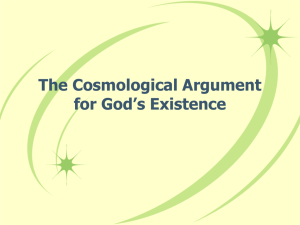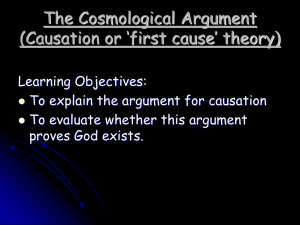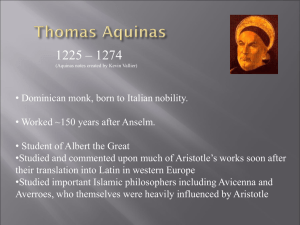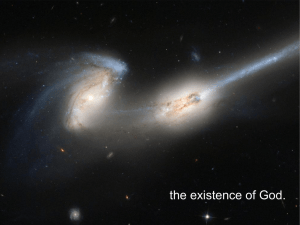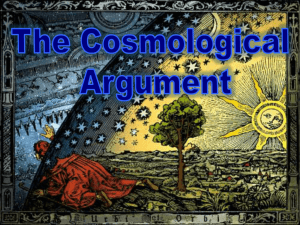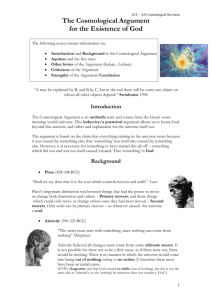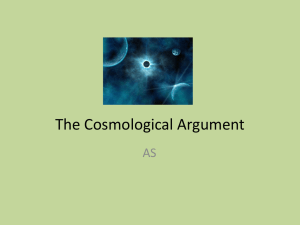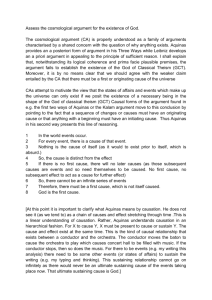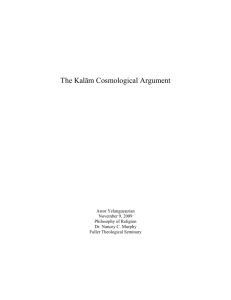God
advertisement
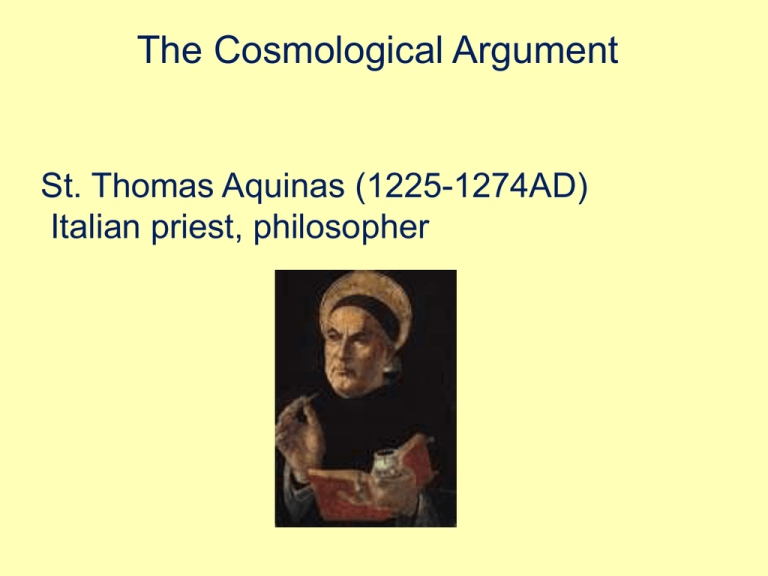
The Cosmological Argument St. Thomas Aquinas (1225-1274AD) Italian priest, philosopher Aquinas’ description of ‘God the Creator’ He alone made the universe All life comes from Him All life relies on Him for existence (all life is contingent) He relies on no other being for existence (God is not contingent) The Argument from the Uncaused Cause Aquinas argued: Everything has a cause Things don’t just appear Every cause has a cause They must have come about by something else – chain reaction This cannot go back forever This chain reaction must have started somewhere Therefore there must be an uncaused cause that isn’t caused by something else The thing that started the chain reaction wasn’t created by something else The uncaused cause is what people understand by God The Argument from the Unmoved Mover Aquinas argued: Everything that moves is moved by something else Nothing moves by itself That mover has been moved by something else Something has had to move it – think of a chain reaction This cannot go back forever or movement wouldn’t have started at all Movement has to start somewhere Therefore there must be an unmoved mover, which isn’t itself moved Something had to start it that hadn’t itself been moved This unmoved mover is what people understand as God The Argument from Possibility and Necessity Aquinas argued: Individual things come into existence and eventually cease to exist Eg humans are born and eventually die, a star is born and will eventually die Therefore at one time none of them existed But, something only comes into existence as a result of something that already exists Things do not come from nothing Therefore, there must be a being who has to exist – a NECESSARY being – God Can ‘reason’ alone prove God exists? (Reason: logical thinking) NO There is no logical scientific evidence to support the existence of God The idea of an infinite God is beyond the understanding of our finite minds It is important to have ‘faith’ to believe in God YES There is evidence to prove God exists eg cause & effect, the order & purpose of the universe It is a logical possibility; everything we know and experience needs a cause and only God could have been that cause It is important that people can be convinced logically that God exists, eg Cosmological Argument, otherwise faith alone wouldn’t be enough whenever someone has doubts What evidence from the natural world could Aquinas have used to support the Cosmological (First Cause) Argument? Empirical evidence (evidence that can be observed and measures) that the universe exists. The universe itself is the most vital piece of evidence for the existence of God If God does not exist the world as we know it cannot be explained Glossary Contingent – relies on something else Necessary – essential, unique, special The Leibniz Version Gottfried Leibniz (1646-1716) German philosopher Why does anything exist at all? Why do things that do exist have the form or shape that they do? God according to Aquinas: Uncaused cause Unmoved mover A necessary being Everything is contingent except God Does the cosmological argument work? The Big Bang Many people believe The Big Bang theory is the best explanation for the existence of the universe. They believe everything even time itself was created at this point, taking away the need for a creator i.e. God. Evidence used to support the Big Bang Theory The rate at which galaxies can be observed moving away from each other shows the universe is still expanding following the initial event around 14 billion years ago. This has been shown using analysis of images and data from the Hubble telescope. Scientists believe cosmological redshift and the Doppler Effect are due to the expansion of the universe. Bertrand Russell (1872- 1970) English philosopher Criticism one: What caused God Russell said that the cosmological argument contradicts itself; if everything needs a cause then so does God. The question ‘What caused God’ is known as the schoolboy objection Criticism two: How can we ever know the universe needs a cause? Russell also suggested that the universe may not have had a cause at all; maybe it has always existed. The only thing we know for sure is the universe exists. David Hume (1711 - 1776) Scottish philosopher Hume also believed that although everything appears to need a cause we could never know if God created the universe as no-one was there to witness it Scientific rejection of the cosmological argument Niels Bohr (1885 – 1962) Danish physicist Bohr, a physicist, tried to show that things can come into existence without any apparent cause. How old is earth? A Creationist’s view Was the world created in 6 days? Looking as far back in time as possible. Images from Hubble Telescope How the elements are made Has the cosmological argument been defeated? Those who agree with the cosmological argument believe there is a difference between physical things (the universe) and spiritual things (God). Many people are more likely to believe a spiritual thing has always existed over a physical thing. Some people believe the fact that there was a starting point, the Big Bang, helps the case of the cosmological argument and that God may have created it. Frederick Charles Copleston, 1907 - 1994 Jesuit priest and historian of philosophy. Copleston said that those who accept that things ‘just are’ are avoiding the issue. Dr. Peter Vardy (born 1945) British philosopher, Vardy says at least by asking the question ‘Why does the universe exist’ some difficult questions are raised. Some people think the Schoolboy Objection, what caused God, is not a good one. They believe God is necessary and not contingent so the question does not even need to be asked. William of Ockham (1288 – c. 1348) English friar and scholastic philosopher Ockham put forward a principle known as Ockham’s Razor, where we should try and answer questions as simply as possible. Hume and Russell try to answer the question by asking new questions; ones not easily answered. Science & Belief Ken Ham Creationist; believes god literally created the world in 6 days. Rejects theory of evolution. Richard Dawkins He says God is not different from the tooth fairy. Dr. Jennifer Wiseman, Senior Project Scientist on the Hubble Space Telescope and a Christian sees science ‘as a God-given gift for studying God’s Handiwork.’ Do you agree that the existence of God is the best explanation for the existence of the universe? Give reasons for your answer. YES It seems logical to believe that the universe has a first cause rather than none at all The universe seems ordered and designed that it is difficult to deny some kind of creative power Belief in the existence of God makes life meaningful for many rather than the thought of an uncaused, chance process NO Scientific principles can explain the existence of the universe without the need for God Belief in the existence of God is a speculative theory with no real evidence to back it up Belief in the existence of God by way of blind faith may stop many people from looking further for a better and more complete explanation for the existence of the universe Is the Big Bang Theory an effective explanation for the existence of the universe? YES It provides an alternative to the Cosmological Argument using scientific evidence NO Some people believe God could have caused the Big Bang The Schoolboy Objection could be used here ie ‘What caused the Big Bang?’ Why might religious people support the Cosmological (or First Cause) Argument? They feel they need an explanation for the existence of anything inc. the universe, life etc. The Cosmological Argument seems to be based on reason & logic If there is a First Cause, ie God, then this gives a reason, purpose and/or meaning to life.

